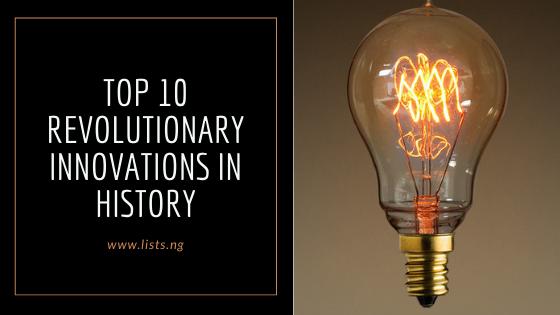From time immemorial, man has always created and innovated in a bid to make life better. From discovering fire to wearing clothes, as the necessity arises, man has found ways to inquire, solve problems and evolve. Till date, advancements continue to be made, however, several key innovations have stood out over the years as revolutionary. Below is our pick for the top 10 revolutionary inventions.
1. Compass

Traditional compasses have become out of date today with the innovation of satellites which enables you to locate anywhere in the world through your phone. However, in the 14th century, magnetic compasses were a revolutionary invention which ushered in the age of discovery. Although it was invented in China for astronomical means and fortune telling, it soon became a tool for navigation. Explorers were provided with a reliable method for navigating the world’s oceans and the discovery of other parts of the world.
2. Vaccines

Vaccination is one of the most effective ways to prevent diseases, and the world owes gratitude for its revolutionary invention to Edward Jenner who considered the founder of vaccinology. Edward Jenner made this invention in 1796, after he inoculated a 13 year-old-boy with vaccinia virus (cowpox), and demonstrated immunity to smallpox. By 1798, the first smallpox vaccine was developed.
3. Printing press

Today, with technology, information spreads with so much speed and ease that you almost have to always double check whatever you are sending out. With this advancement it is easy to ignore the importance of the printing press and how it helped the mass production of uniform printed matter and dissemination of books, pamphlets and newspapers. The innovation was first made in China, before being further developed in Europe in the 15th Century by Johannes Gutenberg and his invention of the Gutenberg press.
4. Electric bulbs

There was once a time when humans only relied on the sun, fire and daylight for illumination. The invention was pioneered in the early 19th century by Humphry Davy with other inventors such as Warren de la Rue, Joseph Wilson Swan and Thomas Alva Edison making significant contributions to the cause. Eventually Edison and Swan patented the first long-lasting light bulbs in 1879 and 1880, and electric lights went on to be used in everything from home lighting and street lamps to flashlights and car headlights.
5. Cars

From road cars to racing vehicles, to petrol-powered, to electric, vehicles have done one job, which is make movement easier and faster. The first steam-powered automobile capable of human transportation was built by Nicolas-Joseph Cugnot in 1769 the, but the creation of the first true automobile has been attributed to Karl Benz who developed a petrol-powered automobile. The Ford Model T become the first automobile to be mass-produced on a moving assembly line, and by 1927, the Ford Motor Company had produced over 15,000,000 Model T automobiles.
6. Clock

The clock is one of the world’s oldest inventions and probably one of the most important. It helps us measure and keep track of time. The first time measuring devices known to man are the sundials which was created originally in Babylon over 6 thousand years ago, and developed into a more functional state in Ancient Egypt. The first precision timekeeping devices (pendulum clock and spiral-hairspring watch) was invented by Dutch polymath and horologist Christiaan Huygens. Over the years, timekeeping devices have evolved and have even become luxurious accessories.
7. Steam engines

The invention of the steam engine paved the way for the creation of transportation methods like cars, airplanes, factories, trains, spacecraft. Thomas Savery developed the first practical use of external combustion with his steam-powered water pump in 1698. Steam engines were then perfected in the late 1700s by James Watt would eventually perfect the steam engines in the late 1700s, giving rise to more innovations in transportation, agriculture and manufacturing as well as ushered in the industrial revolution.
8. Telegraph

Before telephones and emails, telegraph and its wireless successors were the first major advancements in worldwide communication. The earliest true telegraph put into widespread use was the optical telegraph of Claude Chappe, invented in the late 18th century. By the mid-19th century, the electric telegraph started to replace the optical telegraph and telegraph lines multiplied. The invention of the telegraph and the idea of long distance communication impacted every area of society including warfare, trade, business among others
9. Airplanes

The Wilbur and Orville Wright, popularly known as the Wright brothers changed the world when they invented and flew the first airplane in 1903, recognized as “the first sustained and controlled heavier-than-air powered flight” Today, airplanes are used for recreation, transportation of goods and people, military, and research. Worldwide, commercial aviation transports more than four billion passengers annually on airliners and transports more than 200 billion tonne-kilometers of cargo annually.
10. The internet

The internet is the global system of interconnected computer networks used by billions of people all over the world. The creation of the internet gave birth to new services such as email, Internet telephony, Internet television, online music, digital newspapers, video streaming, social media etc. Learning, banking, business among others have also been made easy with the internet. The internet has impacted us so much that in November 2006, it was included on USA Today’s list of New Seven Wonders.
Header image credit:
Creator: Photographer: Kim Pedersen (Information extracted from IPTC Photo Metadata)



